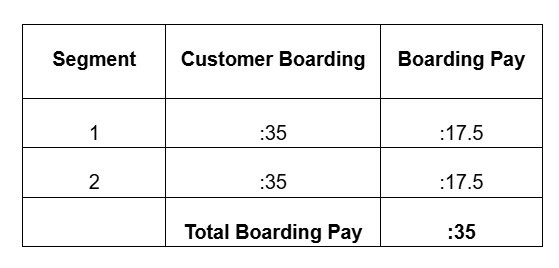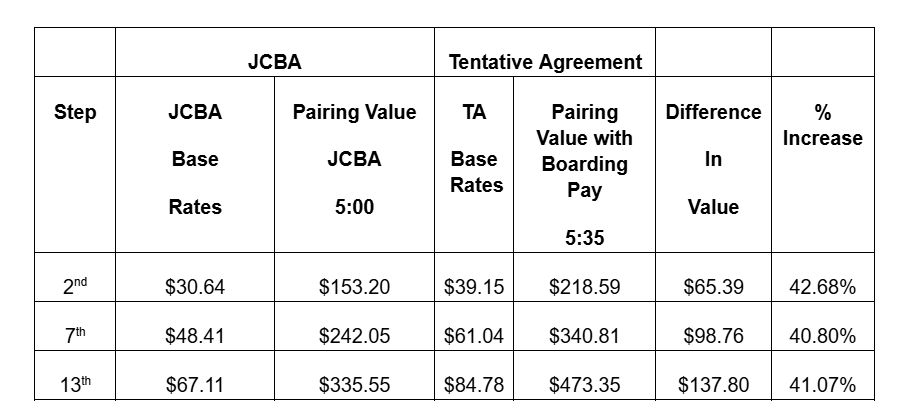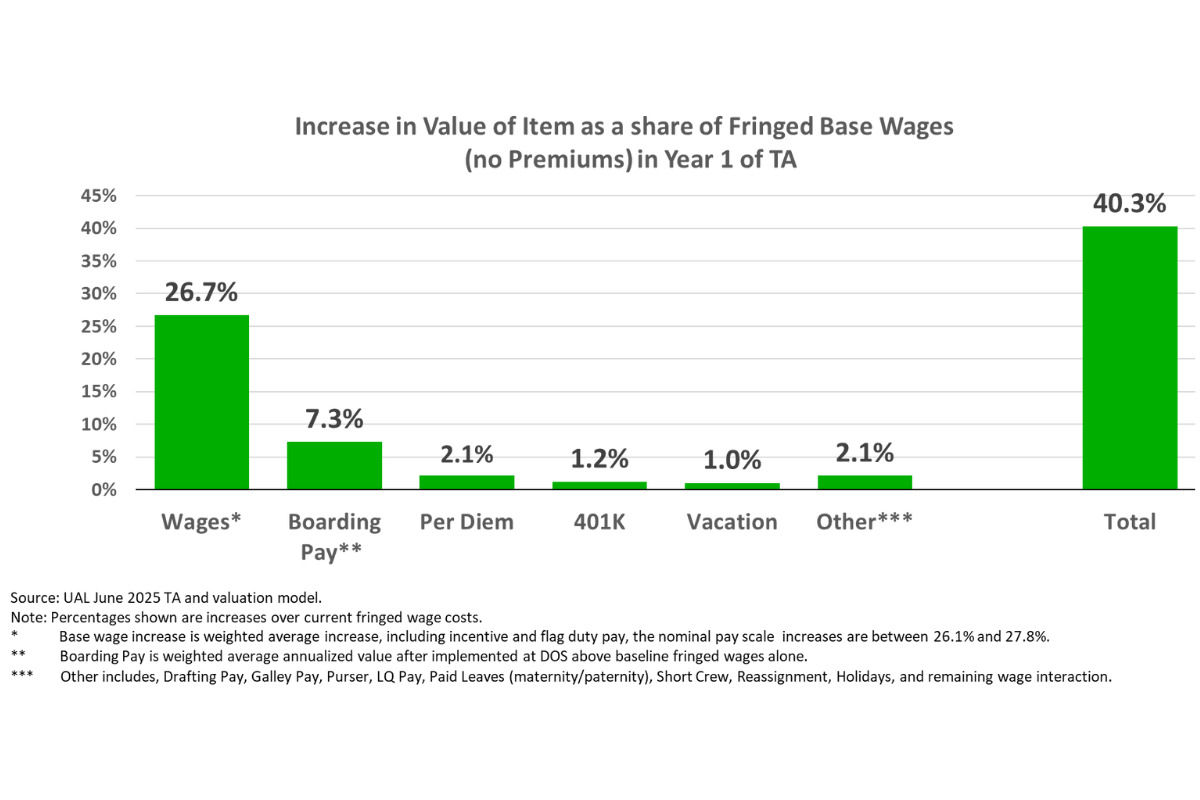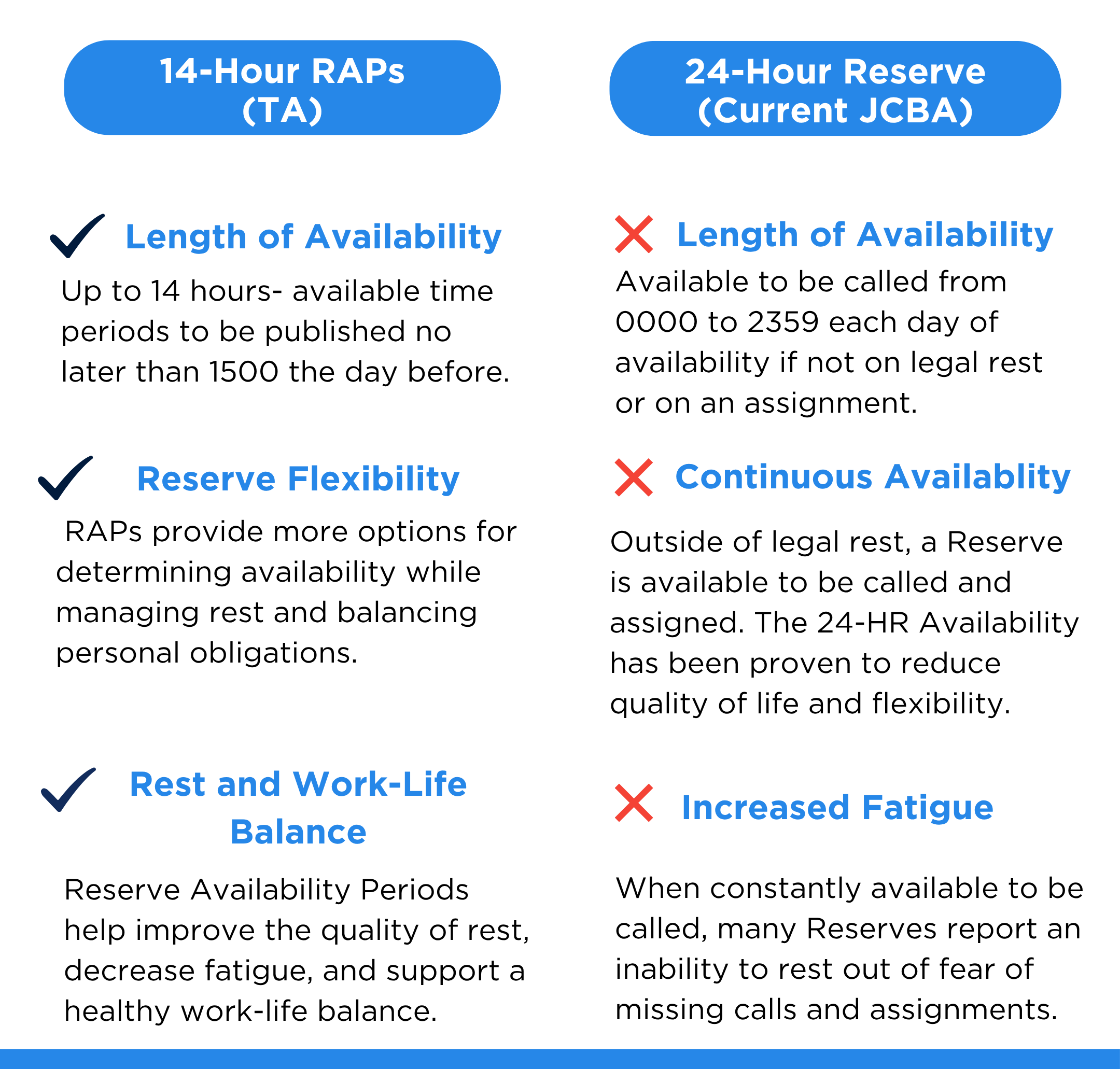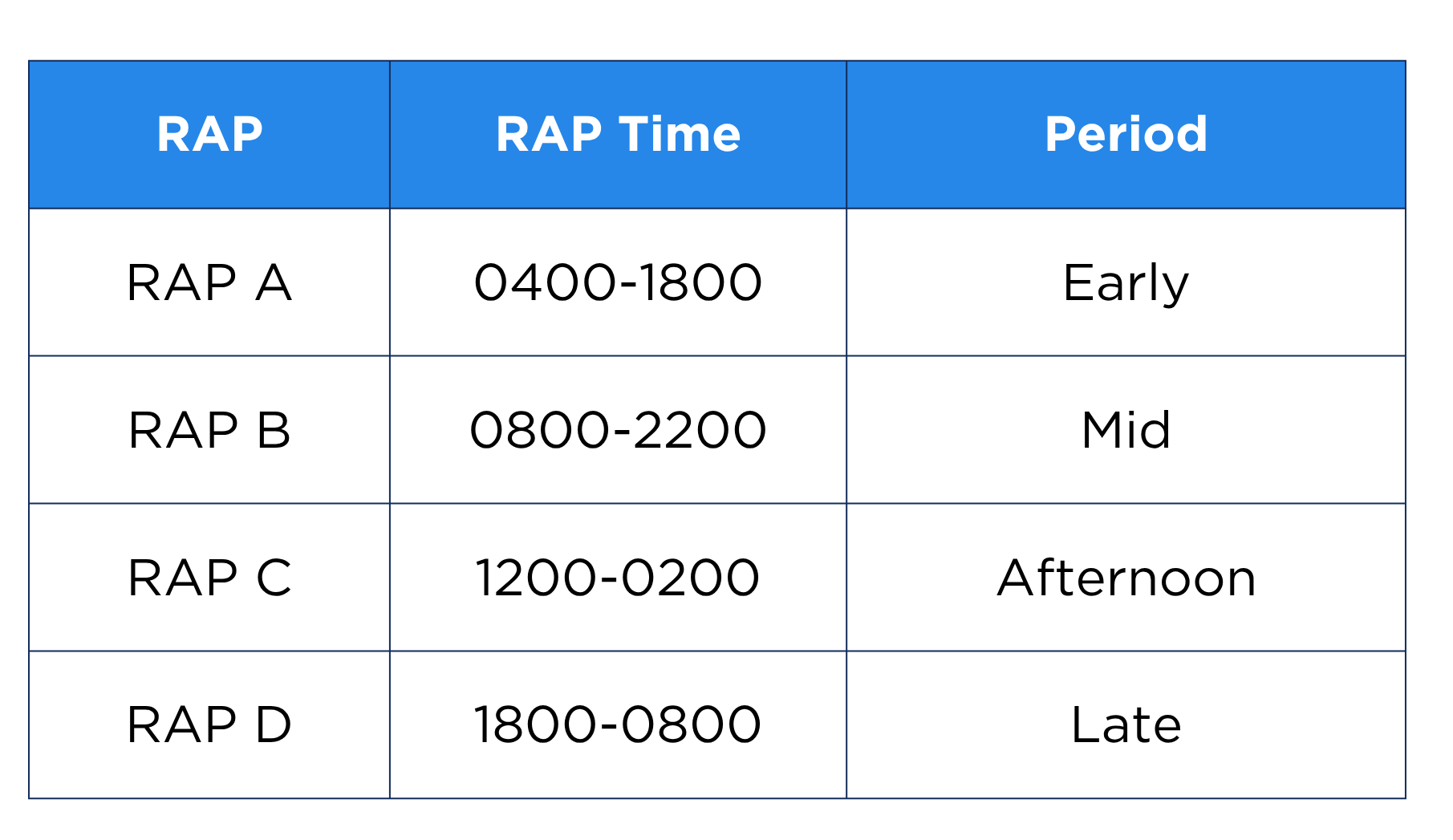
TA 2025 Educational Materials
Economic Improvements
Overall
This Tentative Agreement adds approximately $6,000,000,000 in value over the five years of the Agreement, including Boarding Pay. This represents a 37.3% increase in the total labor costs to the company over five-years. This overall increase in value is higher than that secured by the United pilots and other Flight Attendant groups in recent rounds of negotiations.
For a complete breakdown of the economics of the agreement, please see the video of Dan Aikins, our financial analyst, which details the economics of the deal.
Compensation Increases
This agreement will have a direct and immediate impact on Flight Attendant take home pay. The Tentative Agreement includes immediate pay increases of 26.9%. If the TA is ratified these increased pay rates would go into effect for all flying in the August Bid period, and you would start seeing the impact in the September paychecks.
The Tentative Agreement includes increases in subsequent years, which add up to a 17.3% compounded increase in wages over the course of the Agreement. Overall wages increase by 43.6% to 45.6% over the term of the agreement, excluding boarding pay. When combined with Boarding Pay, overall compensation will increase by 52 to 54%.
This level of increase compares favourably with other workgroups which have settled in recent years. United pilots saw increases of approximately 42% over five years, and American Flight Attendants saw increases of 38.5 to 41% in pay and boarding pay. This means that this TA includes pay increases of over ten to twelve percent higher than those of these workgroups.
Boarding Pay Impact
Boarding pay will add another 7.3% increase to Flight Attendant paychecks. The amount of boarding pay received will depend on the number of unpaid boardings you currently perform, based on the type of trips you fly. We encourage Flight Attendants to check out the boarding pay calculator to get exact numbers based on the type of flying hold. To see how all the provisions interact, please try the pairing calculator, which will show the impact of pay increases, boarding, per diem, etc.
Below is an example of the impact of Boarding Pay on a narrow-body turn. In this example, the Boarding pay adds 35 minutes of pay to the pairing, which represents an 11.66% increase in the value of the pairing. When combined with pay increases, this produces overall pay increases of 40.8% to 42.68%, depending on seniority. Now, the boarding pay will be a greater percentage if you have multi-day segments and less if you have more international flying, which pays more by block pay.
Typical 5-Hour Turn (NB) A320
Boarding pay will take time to program and will be implemented in the December Bid period, which will show up on your January paychecks.
Combined Impact
Block Pay, Boarding Pay, increases in premiums, 401K contribution increases, higher vacation rates, and other provisions all directly impact Flight Attendant earnings. Taken together, these provisions on average will increase Flight Attendant earnings on average 40% in the first year of the agreement.
All of these items add up to increase the total compensation in Flight Attendants' pocketbooks.
Retro Pay
This tentative agreement includes $595 million in Retro pay based on the highest formula in the industry. If the TA is passed, Flight Attendants will see the retro pay before October 31.
4% of Eligible Earnings for the September 2021 through December 2021 Bid Periods
4% of Eligible Earnings for bid year 2022
4% of Eligible Earnings for bid year 2023
14% of Eligible Earnings for bid year 2024
25% of Eligible Earnings for the January 2025 through the July 2025 Bid Periods
To see your exact retro payment, please use our Retro calculator.
Reserve
Reserve System Under the TA Explained
The Reserve section in our Tentative Agreement (TA) introduces Reserve Availability Periods (RAPs) to improve scheduling and rest management for Reserves. RAPs provide flexibility with a window of up to 14 hours for assignments, allowing Reserves more control over their availability.
Reserve Availability Periods help improve the quality of rest, decrease fatigue, and support a healthy work-life balance. RAPs encourage workload management while emphasizing Flight Attendant well-being by limiting 24-hour availability. These enhancements promote safety, efficient scheduling, and a structured process for Reserve Flight Attendants.
Additionally, our TA provides more control for RSV Flight Attendants with provisions to pick up trips coming in from days off. This is a voluntary process providing more options for assignments coming into the operation.
Every Reserve Flight Attendant has personal preferences when it comes to how they fly. The inclusion of a RAP process does not take away the option for 24-hour RSV. If a Flight Attendant would like to remain on call for 24 hours, this choice remains available. Our TA puts the power of choice back in the hands of Reserve Flight Attendants and opens the door to continued improvements in the future.
RAPs VS. 24-Hour Reserve
A Reserve Availability Period (RAP) is a designated window of up to 14 hours during which a Reserve must be available for assignment.
How RAPs Work
The company will establish the number of available RAPs for each day. Every base will have a minimum of one RAP available daily, with many bases offering multiple RAPs.
Generally, RAPs will be categorized into the following start time ranges:
Early (0000-0559)
Mid (0600-1159)
Afternoon (1200-1759)
Late (1800-2359)
During your assigned RAP, you are available to be contacted by the company for assignment.
The three-hour Call-out period applies even at the start of the RAP.
A Reserve shall only be assigned open pairings with check-in times no more than 3 hours after the end of the RAP. Assigned Standby assignments must terminate no more than 4 hours after the end of the RAP.
At the end of the RAP, if unassigned, you are automatically released from contact until your next period of availability or assignment.
Examples of RAP Windows
*Actual RAPs will be determined on a daily basis by scheduling and do not have to match the assignments shown here. These are examples only.
Daily Reserve Assignment Process
This is the order of the Reserve assignment process that will occur each day. All Reserves available for the following day will proceed through each step of the process until they have an assignment. Those who choose not to participate or remain unassigned will then be considered for assignment during the subsequent steps until the process is complete.
Coming from a Day Off (Pick-up Window)
Voluntary Process- Reserve must initiate
Between 1300 and 1400, a Reserve can go into Open Time and select an available pairing that checks in between 0400-0800.
The pairing must match their days of availability classification.
Once picked up, the Flight Attendant is released to check in.
Reserve Preferencing Run
Regular Nightly Process- All Reserves remaining available shall be allowed to participate in the Reserve Preferencing process.
At 1500, the list of assignments in Open Time will be captured and considered frozen, allowing Reserves to preference any available pairing or Standby assignment. During this period, Reserves may also submit a RAP request. Daily and Standing Preferences on file are recorded at 1600, and the system processes them at 1700.
All Reserves, regardless of whether or not they have a preference on file, are eligible for and may receive an assignment during this step of the process.
Clean-up and Releasing Process
Any pairings that were not assigned during the Reserve Preference run will be manually assigned by scheduling.
Scheduling will evaluate the remaining number of available Reserves for the following day. If there is an overage, excess Reserves will be released.
Remaining Reserves will be assigned to Ready Reserve.
RAP Assignment Process for Ready Reserves
Those on Ready Reserve will be assigned a RAP based on their preferences.
Any Reserve that indicates a preference for a RAP will be assigned to an available RAP for which they are eligible, even if their preferred RAP is not available.
Reserves who do not participate in the RAP selection process or opt to remain on 24-hour Reserve will be classified as 24-hour Ready Reserves.
All assignments will be available at 1930 HDT
-
Improving the Reserve System was a major topic of this round of negotiations. We were able to achieve significant improvements, including Reserve Availability periods, flexibility in trip trading, and other provisions impacting Reserve quality of life. This article will walk through the Reserve improvements in detail.
The major improvement in the Reserve System is the establishment of a Reserve Availability Period, eliminating the 24 hour call out except in circumstances that a Reserve volunteers or fails to bid for a RAP. A Reserve will have the ability to have a standing preference for a RAP so no Reserve will be forced to be on 24 hour call.
The RAPs will be 14 hours, and the start times will be published by 1500 the day prior. The Reserves will preference for their RAPs for the following day as part of the reserve preferencing process, after trips are assigned, clean up has been completed, and any excess reserves have been released. Any remaining Reserves will be assigned a RAP unless they have not inputted a preference or have preferred to be on 24 hours Reserve.
The Reserve will check CCS at the start of their RAP but it is important to know that because the Reserve must be provided a three hour call out, the Reserve cannot receive any assignment which requires them to report during the first three hours of the RAP. A Reserve must receive their assignment during the RAP, and the assignment must have a check in time no later than three hours following the end of the RAP. A Ready Reserve will be automatically released at the end of their RAP if they are not given an assignment.
The fourteen hour RAP was established after substantial negotiations of the RAPs. The company was adamantly opposed to RAPs, but even when they began to consider them, they wanted to take away our three hour call out and limit RAPs to the main hubs. In the end, a compromise was reached with the fourteen hour RAPs, RAPs in all bases, and maintaining the three hour call out.
The RAP system negotiated includes the ability to extend the RAP no more than four times a month by five hours, but the Reserve will receive three hours of add pay, which is paid on top of the guarantee. This three hours of pay is intended to compensate the Reserves but also to disincentivize management from utilizing this extension. The Reserve must be notified of the extension no later than two hours prior to the end of the RAP.
Obtaining RAPs was one of the key battles of these negotiations. We are pleased to have established RAPs in this Contract. The provisions negotiated will provide immediate relief for Reserves and provide a building block for subsequent negotiations.
-
The implementation of RAPs was only one of the improvements to the Reserve system. The Move up line process was improved to provide move up lines earlier, before the month starts.
Additionally, several changes were made to the assignment process. Reserves are no longer subject to displacement by a lineholder once they have received an assignment. They will be treated like any other Flight Attendant in that regard.
Between 1300 and 1400 on the last day off before a block of days of availability, a Reserve shall have the ability to pick up a pairing from Open Time that departs the following day. This allows Reserves more control over their own schedule by being able to self-assign open trips rather than simply accepting what management offers.
A Reserve may choose to receive Reserve assignments by text instead of phone calls for those who prefer to avoid discussions with Crew Scheduling. A standby Reserve limited to four (4) preboarding assignments per standby.
-
This Tentative Agreement directs significant economic improvements to junior Flight Attendants with wage increases which, when combined with wage progression, will more than double the income of many junior Reserves within a couple of years. Just considering wage increases, a second-year Flight Attendant currently makes $30.64. By the end of the Agreement, this Flight Attendant will make $69.54 (not including Boarding Pay), which is higher than a top of the payscale Flight Attendant today.
Reserves and Junior Flight Attendants tend to fly trips that contain more flight segments, which means more take-offs and landings. If the types of trips you fly as a Reserve typically have between two or three legs a day, you can expect a 10 to 20 percent increase in the value of your pairings. We encourage all Reserves to check out the pairing calculator to input the type of pairings you typically fly.
This time will be paid as Add pay, meaning this will be paid in addition to the guarantee. So for example a Reserve who has 18boardings in a month (with 40 minute boardings), would receive an extra six hours above the guarantee.
Implementation Letter of Agreement
-
Below is the Implementation Letter of Agreement, which includes implementation dates for particular provisions of the Agreement, along with improved language holding the company accountable for any implementation delays. Having an accurate and detailed implementation schedule is important to ensure our negotiated provisions go into effect as soon as possible.
The Implementation Letter for the Tentative Agreement contains a number of improvements from the implementation letter in the JCBA (current contract) to ensure that any implementation delays are addressed. A key improved provision is an arbitrator who will oversee the implementation and is empowered to “establish and amend timelines and to provide relief to any party harmed by delay in implementation including any Flight Attendant or group of Flight Attendants affected by the unresolved issues, regardless of whether the individual Flight Attendant(s) can demonstrate a specific harm related to the delay.”
What this means is the arbitrator will have the say over any disputes of the implementation timeline, and the arbitrator specifically has the authority to grant a remedy for any Flight Attendant who has been affected by delay. This addresses a key issue that many have expressed regarding the lack of repercussions for management in cases of delayed implementation.
Additionally, the Implementation Letter sets up a quarterly status review meeting to oversee the process and ensure implementation is on track with established timelines. The parties are directed to come up with solutions that will require additional programming resources. If the parties do not agree, the matter can be submitted to the dispute resolution process, including arbitration.
The implementation will be overseen by an equal number of Union and company members, who shall be called the Joint Implementation Team (JIT). The JIT shall have the authority to address all matters related to implementation. Within ninety days of the date of Signing of this Agreement, if ratified, the JIT will agree upon and publish a list of dates for those items which require additional complex programming.
Some of the more complex programming issues, such as RAPs and the elimination of sub bases will require detailed programming. In order to ensure that we have the shortest possible implementation periods the JIT will need time to extensively meet with the company’s Digital Technologies department and fully vet all aspects of implementation.
Pay rates and per diem will go into effect with the August Bid month. A full list of the provisions going into effect in the August Bid month can be found in Appendix A. Provisions which require more time to program are found in Appendix B.
Boarding Pay will require time for programming and will not be implemented on the Date of Signing. We have been clear that implementation of this provision must be a top priority and pushed to get additional resources to implement this provision.
Boarding pay requires an automated process. With 28,000 Flight Attendants working, potentially, dozens of boardings in a month, it will not be something that can be accomplished manually. United management will not start any programming provisions of the Tentative Agreement until we have a ratified agreement, this will require an implementation period.
After much discussion, we have reached an agreement with the company on this provision. Boarding pay will be implemented for boarding conducted in the December Bid period, paid in January, which is a period of four months following ratification. The company initially wanted six months for implementation, which is the amount of time provided in the American Airlines Flight Attendant agreement last year. We felt strongly that six months was too long and aggressively pushed to shorten that time frame. We were able to get the implementation down to four months, which is the minimum amount of time the Company’s technology department needs to program the provisions.
Boarding Pay will be implemented in the December Bid Month for flying in December and forward, and will not be paid as back pay. When the company agreed to an industry-leading $595 million in Retro Pay, they factored in the savings from a delayed implementation of boarding. The Boarding Pay language has a firm date of the December 2025 Bid Period and is not a target date. The company is required to start paying Boarding Pay on that date.
-
Click Here to read the Implementation LOA
Hotels
-
One of the major topics of discussion in these negotiations was the issue of hotel location, selection, and quality. Securing quality hotels in desirable locations was a major focus of Bargaining.
In this Tentative Agreement, we secured significant improvements in the hotel section, which are outlined below. The improvements include:
Reducing the downtown layover threshold from 19 to 17
Eliminating the “downtown-like” loophole from the agreement
Dramatically improving Union involvement in hotel selection, with enforceable Contract Language
The current threshold for downtown is 19 hours, which the committee believed was too long. We did not want to use an overly restrictive number, so we settled on 17. Changing this number has a cost to the company and was one of the economic improvements of the deal.
The “downtown-like” loophole has been a major problem as management has used it to place Flight Attendants in non-desirable locations. Getting rid of this loophole was a major priority in these negotiations. Now the downtown layovers need to be downtown.
Equally important are the changes to the hotel sourcing Letter of Agreement, which governs AFA's involvement in hotel selection. Here we have fundamentally changed the process, including requiring the company to include requisite for proposals from the Union for any hotel other than the high-end luxury hotels (e.g. the Ritz-Carlton, Four Seasons).
A key provision is that the language now says that if consensus is not reached, the Hotel Dispute Process can be invoked. The dispute process ends in expedited arbitration, so if the parties cannot agree, an outside arbitrator can make the determination based on our new and improved Contract language.
To be clear, this language improves the hotel selection, retaining and improving the list of required items for hotel section. You will notice it does not use the term “business class” hotel, and that is by design. That is not a useful term in the days of low-end business hotels and does
not capture the quality of hotels we deserve to stay in. By opening up to all hotels, except the ultra-luxury hotels, we have expanded the language.
The quality and duration of layover hotels ranked very high on our priority list in these negotiations based on Flight Attendant feedback. The improvements in the hotel quality were part of the over $700 million in non-core wage improvements over the course of this TA. However, given that we spend a significant part of our working lives in hotels, winning strong hotel language was a top priority, and we are confident that these changes will enhance the layover experience at hotels.
Benefits
-
The Tentative Agreement specifies that a Flight Attendant must maintain a minimum number of credited hours per year to receive the employer's contribution for health care benefits. The language is carefully crafted to limit the impact on Flight Attendants and ensure that those with medical and other personal emergencies maintain health care.
With the negotiated language, we are confident that Flight Attendants who are ill or otherwise unable to maintain the 480 hours will be protected through the many negotiated exceptions and credits. Below, we will walk you through the provisions in detail.
In order to receive employer contributions for health care, Flight Attendants must maintain 480 hours of flight time credit in a calendar year. Flight Time credit includes:
Flight time credit, including all time credited towards assignments
Vacation
Paid sick leave
Training
Deadheads
FMLA
Other leaves protected by law (such as California KinCare, Colorado Family Leave, etc)
The greater of Reserve guarantee or Reserve credit in a month
The 480 hours will be reduced by any time on an unpaid leave of absence. For example, if a Flight Attendant is on a medical leave for eight months, the 480 hours would be reduced proportionally by 320 hours, so their requirement would be 140 hours for that year. If a Flight Attendant was out the entire year, their requirement would be reduced to zero.
These credit reductions apply to taking any leave of absence (COLA, Medical, Maternity, Parental, Adoption, FMLA, Military, Personal, etc.). They also include any leaves protected by federal law and state law.
In addition, we negotiated language unique to this TA, which is the most protective in the entire industry, that specifies Flight Attendants will receive a credit for any month they have special circumstances that limit their ability to fly. This includes urgent personal circumstances (e.g., family care, natural disasters, or other personal circumstances that result in a reduced ability to fly).
The urgent circumstances exception addresses situations where a Flight Attendant may not need a full leave of absence but has circumstances that limit their ability to fly.
An important example of a protected situation is a Flight Attendant who has returned to work after a medical leave. While they may be back to flying, they could still need to miss trips due to ongoing treatment or recurring symptoms; this Flight Attendant would have this time reduced from their yearly credit. Even if they do not currently qualify for FMLA, they would be covered by our provisions. This is exactly the situation this exemption would cover. The exemption would cover them and receive a credit in any months the exemption applied.
While the requirement to maintain a minimum level of flying is new to an agreement we have seen before, these provisions are commonplace in the airline industry and in other industries. Coming from the highest levels of the company, United Airlines was not willing to continue to offer medical coverage to a very small subset of Flight Attendants who bid lines only to drop them all so they can get medical benefits, some never flying for years. Their position is unlikely to change in any subsequent TA should we return to the table in the future.
AFA has consistently fought to ensure that those with medical conditions or other emergencies have health care when they need it most. We are confident that these provisions protect those who need health care the most.
Electronic Communication
-
During layovers and sits, management can attempt to notify you during these times, but you are not required to acknowledge. They must make positive contact.
Your requirement to check CCS is once at check-in, after arrival of your flights, with the exception of your last flight (of the pairing) and upon cancellation of a trip, which also now automatically starts the four-hour reassignment clock. But during your sit time or layover, there is no requirement to acknowledge or respond to Notifler or CCS priority messages.
-
There is no change in the Tentative Agreement on contact during a layover from current practice. The current rule is Flight Attendants are required to be reasonably available on a layover. This comes from a decision of the arbitrator of the System Board of Adjustment where the arbitrator ruled Flight Attendants must be “reasonably available,” which simply means if the Flight Attendants knows the company is attempting to contact them they will need to check their schedule.
On layovers, Flight Attendants are not required to answer the phone or acknowledge any particular electronic communication. The language in the Tentative Agreement states, as is current practice, the company will attempt to contact the Flight Attendant at their phone number on record and at the hotel.
-
As it is currently, management can attempt to contact you electronically prior to your trip but you are not required to acknowledge. If you do not acknowledge the call within 5 minutes after the final call, you will be considered notified of your new assignment. If you choose not to acknowledge the notification, you can wait until check-in to find out your new assignment as you can do currently.
We have established a clear rule and if they contact you less than 2:15 before your check-in time, your duty time will remain unchanged - in other words, your duty time will begin at the scheduled check-in time. If notification occurs at least 2:15 before check-in, your duty time may be revised but cannot start earlier than the original scheduled time.
-
A major improvement is the four hour clock for reassignment now starts at the time of flight cancellation. Currently the clock starts only upon contact with crew scheduling which in irregular operations can take hours. Under the current process, the four hour clock can start long after the flight cancelation, allowing management extra time to reschedule Flight Attendants. Under the TA language, no more waiting for hours to contact crew scheduling in order to start the clock. If no reassignment after the four hour window closes, you are released with pay and no longer subject to reassignment.
The notification language is also much more clear, removing gray areas so Flight Attendants know exactly what to expect.
-
The current language on notification was written in the 1980s and 1990s prior to cell phones and other means of contact. In other Flight Attendant and Pilot negotiations, this language is being updated to address new realities of communication.
The committee's goals in this area were to preserve positive contact, limit contacts with crew scheduling, eliminate grey areas, and to reduce time spent on hold trying to get through to crew scheduling. Many members also expressed to both our union and the company that they prefer electronic notification.
-
Our goal was to limit the requirement to check our schedule while we are between flights, eating, and using the time to contact family, exercise, or sleep. By limiting the requirement to check schedules to immediately following a flight (except for the final segment of a pairing), it removes any ongoing obligation to check schedules.
Understanding Reserve Availability Periods (RAPs)
-
14-hour availability windows
Not contactable outside RAP
Published RAP for following day by 1500
Only assigned open pairings with check-in times no more then 3 hours after the end of RAP
A Ready Reserve shall only be assigned a stand-by period that is scheduled to terminate no more then 4 hours after the end of the RAP
Auto-released at end of RAP if not given assignment
14 hours not 12 in order to preserve our 3 hour short call
-
The company must call a Reserve 2 hours before their RAP is set to end, to notify the Reserve they are being extended.
This can only happen up to four times per month.
Those who volunteer to be worked past the end of their RAP, will be called before those who do not.
Additionally, those who are extended past their RAP end period will receive three hours of ADD PAY, above their Reserve guarantee.
